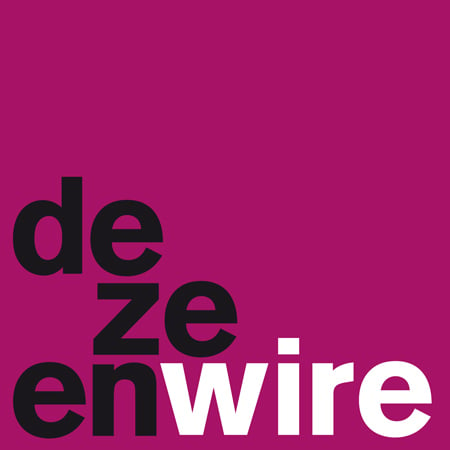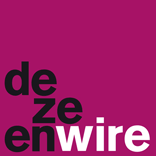
Designers of the Future Award winners announced
Dezeenwire: Design Miami/Basel have announced designers Beta Tank, Graham Hudson, rAndom International, Zigelbaum & Coelho as winners of this year's Designers of the Future Award. See press release below:
DESIGN MIAMI/ BASEL PARTNERS WITH W HOTELS AND PRESENTS THE WINNERS OF THE 2010 W HOTELS DESIGNERS OF THE FUTURE AWARD
Since its inception, Design Miami/ Basel has guided its Designers of the Future Award toward the recognition of designers working in innovative ways – whether new materials, new processes, or new approaches. The goal of the Award, launched in 2006, is to offer the best representatives of the next generation of design creatives the opportunity to present newly commissioned work to a powerful audience of collectors, dealers and journalists, drawing attention to design practices that exemplify new directions for the future of the field.
This year, Design Miami/ Basel is pleased to announce its new partnership with W Hotels in presenting the 2010 W Hotels Designers of the Future Award. This alliance will allow Design Miami/ Basel to expand the benefits that the award brings to the winners, including the chance for the commissioned projects to have a life after the fair through practical applications within W’s sites around the world.
The 2010 W Hotels Designers of the Future Awards winners are:
- Beta Tank
- Graham Hudson
- rAndom International
- Zigelbaum & Coelho
These four winners were chosen by a selection committee comprising of Ambra Medda, Director, and Wava Carpenter, Associate Director, Design Miami/; Mike Tiedy, SVP, Global Brand Design & Innovation, Starwood Hotels & Resorts Worldwide, Inc.; and Marcus Fairs, Editor-in-Chief, Dezeen.com.
“Innovation is at the core of W’s design philosophy,” says Mike Tiedy. “The work of these four winners represents exactly the type of forward-thinking design that W Hotels seeks to bring to its new and existing hotels all around the globe.”
“W Hotels has been a design led brand and an innovator in its category from the very beginning,” says Eva Ziegler, Global Brand Leader, W Hotels Worldwide. “We are thrilled to be able to partner with Design Miami/Basel and be involved in recognizing the cutting-edge works of these upcoming and emerging young talents and look forward to showcasing their work to a global audience at our hotels.”
While the Designers of the Future Award has always featured unique and ground- breaking design work embodying the most progressive attitudes of each year, this year’s award pushes the drive towards experimentation further than ever. Exploring design work created at the very edges of the discipline, the 2010 W Hotels Designers of the Future Award will look beyond pure product and furniture design to embrace conceptually and technologically vanguard work that bridges multiple areas of practice including art, sociology, and science.
“This year, we wanted to emphasize recent advancements in novel ‘design thinking’ that involve rich intersections between a variety of creative fields while exploring modes of design work that are particularly interactive” comments Design Miami/ Associate Director Wava Carpenter. She adds, “The common thread shared by the four diverse award winners consists of experiential and cross-disciplinary approaches that prompt visitors to participate and re-think the definitions of design practice.”
”I think this year’s award is particularly exciting because, through the resources of W Hotels, we’re able to provide the designers with the opportunity to create work with a practical/commercial application, but at the same time we’re commissioning designers whose work is especially conceptual.” Says Ambra. She adds, “I’m so proud to see that Design Miami/ has found a new way to present itself as a platform that encourages new collaborations and intersections of culture and commerce.”
Berlin-based studio Beta Tank exemplifies the “design-for-debate” strand of contemporary design practice. For their commissioned project in Basel, Beta Tank will tackle the complex debate over the differences between art and design. The duo will harness aspects of international tax and shipping laws to question and reveal some of the arbitrary assumptions underlying the policies of the legal bureaucratic entities that regulate cultural production. The studio will create a series of ‘blended’ objects – partly hand-made, partly machine-made – that will be delivered to the fair in separate shipments, incurring different customs charges along the way. “This project is a reflection of how we work simultaneously in the realms of the theoretical and the practical,” states Beta Tank's Eyal Burstein. “We want to understand how true innovation and creativity, that which crosses boundaries and moves into the unknown, can be actively pursued and matched within existing categories and assumptions about business practices and results.” "And then we would like to transform these ideas into objects and homes," adds Michele Gauler, "to somehow embed objects with ideas and discourse, to tell a wonderful story." This project will form part of a book that the studio is producing to help guide young creative businesses through the maze of business models.
Although he comes from the art world, Graham Hudson is planning to create the most practical project for his award commission. Hudson has taken up a challenge posed by W Hotels to create a modular bar/DJ booth that can be installed temporarily at sites around the world – a sort of ‘party to go.’ Hudson jumped at this opportunity because he has a great interest in the demise of the 1990’s club
scene in London, and sees this project as a way to memorialize a pre-internet, socially-dynamic era. "I'm not a designer, but I use a lot of raw and ready-made materials in public spaces, so there's a lot of crossover; design and architecture is very much part of my work's language, so it's great that this side has been acknowledged – and a nice reminder of design's non-fixed boundaries..." says British artist, Graham Hudson, referring to his selection for the Designers of the Future Award. Hudson’s work has taken many forms but consistently demonstrates how today’s creatives are forging new paths through site-specific installations meant to promote social interaction and playful engagement with repurposed materials.
London and Berlin-based studio rAndom International represents a strand of creatives who employ cutting-edge technology and digital programming to develop interactive installations that combine the aims of both art and design. According to co-founder Hannes Koch, “Our work has a function: to generate a response.” For Design Miami/ Basel, rAndom International will create a new installation composed of lights that have been programmed to “dance” in response to the visitor’s body movements. Koch adds, “We are curious about the behavior of objects and want to reveal the hidden beauty and poetry in technology.”
For Design Miami/ Basel, Zigelbaum & Coelho will create “Six-Forty by Four- Eighty,” an interactive installation of thousands of graspable, luminescent pixels controlled by remote light brushes. The project blurs the boundaries between the digital and the physical while presenting a new solution for controllable, ambient lighting for interior spaces. W Hotels sees a fit between this project and the brand’s ‘Living Room’ approach to lobby areas, in which people are encouraged to hang out, socialize and enjoy their surroundings. “Primed by the biases of our visual culture, the pixel has ascended as the digital realm's primary ambassador, but it has been a deceitful emissary,” says Jaime Zigelbaum. “By transposing the pixel from the confines of the screen and into the physical world, focus is drawn to the materiality of computation itself, and new forms for design emerge from the exposed spaces between media.” Marcelo Coelho adds, “Our participation means that we, the bastard children of art, design, engineering, and human-computer interaction, are invited into the family home. And just in time to get to work. Computational material is new again.”
Beta Tank
Beta Tank is a design practice based in Berlin and London, founded by Michele Gauler and Eyal Burstein to take on large, complex social and technological issues and translate them into easily understood objects and services. Their projects develop from a deep interest in how humans adapt to progress in their everyday lives. While Beta Tank's designs may seem fantastic or magical they are always based on available technologies and address timeless human behaviours and needs. Michele Gauler studied Psychology and Human-Computer Interaction and worked for IBM with their user experience team before moving to London for an MA in Design Interaction at the Royal College of Art. Eyal Burstein studied graphic
design at the London College of Printing, then Design Interaction at the Royal College of Art.
Graham Hudson
Graham Hudson (b.1977) received an MFA from Royal College of Art, London in 2002 and lives and works in London. Hudson's work operates across sculpture, architecture and design, producing both objects and installations in a variety of media. Recent solo exhibitions include ZINGERpresents, Amsterdam (2010) and Montior, Rome (2009). Recent group exhibitions include Points and Lines, LMCC Sculpture Park, New York (2009), Frieze Sculpture Park, London (2009), Enzo Mari's Autoprogettazione Project, Architectural Association, London (2009) and projects at the Baltic, Newcastle, MK Gallery, Milton Keynes, and Camden Arts Centre London. Commissions have included Comme des Garcons, Dover Street Market, London, Comme Des Garcons, Aoyama, Tokyo, and Workshop Workshop at Design Miami/ 09. Forthcoming exhibitions include 'Newspeak' Saatchi Gallery, London, Sculpture Roof, CRISP, London, and a solo exhibition at ArtHouse, Texas in 2011.
rAndom International
After meeting at the Royal College of Art in 2002, Stuart Wood, Flo Ortkrass and Hannes Koch founded the London-based collective rAndom International with a vision to create engaging and experimental art and design projects. Working within the frontiers of innovation across science, art and design, rAndom International has developed a series of increasingly experimental installations that aim to re- interpret the ‘cold’ nature of digital-based work by providing the viewer with the opportunity to have a more hands-on and aesthetic experience with technology.
Zigelbaum & Coelho
Zigelbaum & Coelho is a post-industrial design studio founded by Jamie Zigelbaum and Marcelo Coelho. Operating at the intersection of design, technology, science, and art, their work utilises physical, computational, and cultural materials in the service of creating new, but fundamentally human, experiences. Jamie and Marcelo began collaborating while students at the MIT Media Lab. They have lectured, published and exhibited internationally; taught classes on next generation interface design and fabrication techniques at MIT; and organised international workshops and conferences in the fields of transitive materials, reality-based interaction, and tangible interfaces. Jamie’s multidisciplinary work straddles design, human-computer interaction, media theory and cognitive science. Marcelo is an inventor of paper computers, shape-changing composites, interactive garments and digital gastronomy. His multidisciplinary Transitive Materials workshops bring together artists, designers, scientists and researchers working at the shifting boundaries between people, materials and computers. Both based in the United States, they push bits, and occasionally atoms, between Los Angeles and Cambridge.

Back to Dezeenwire »
Back to Dezeen »